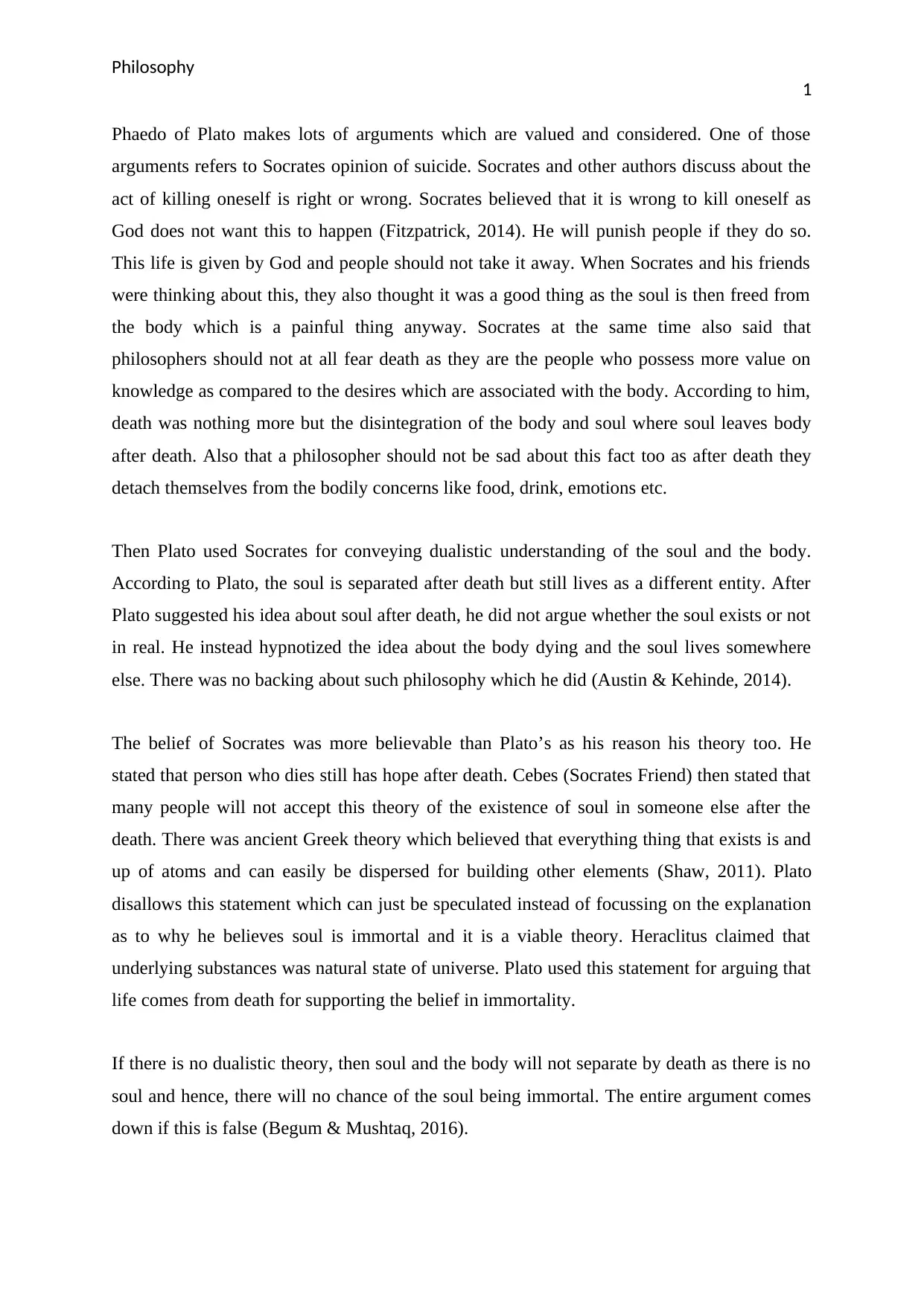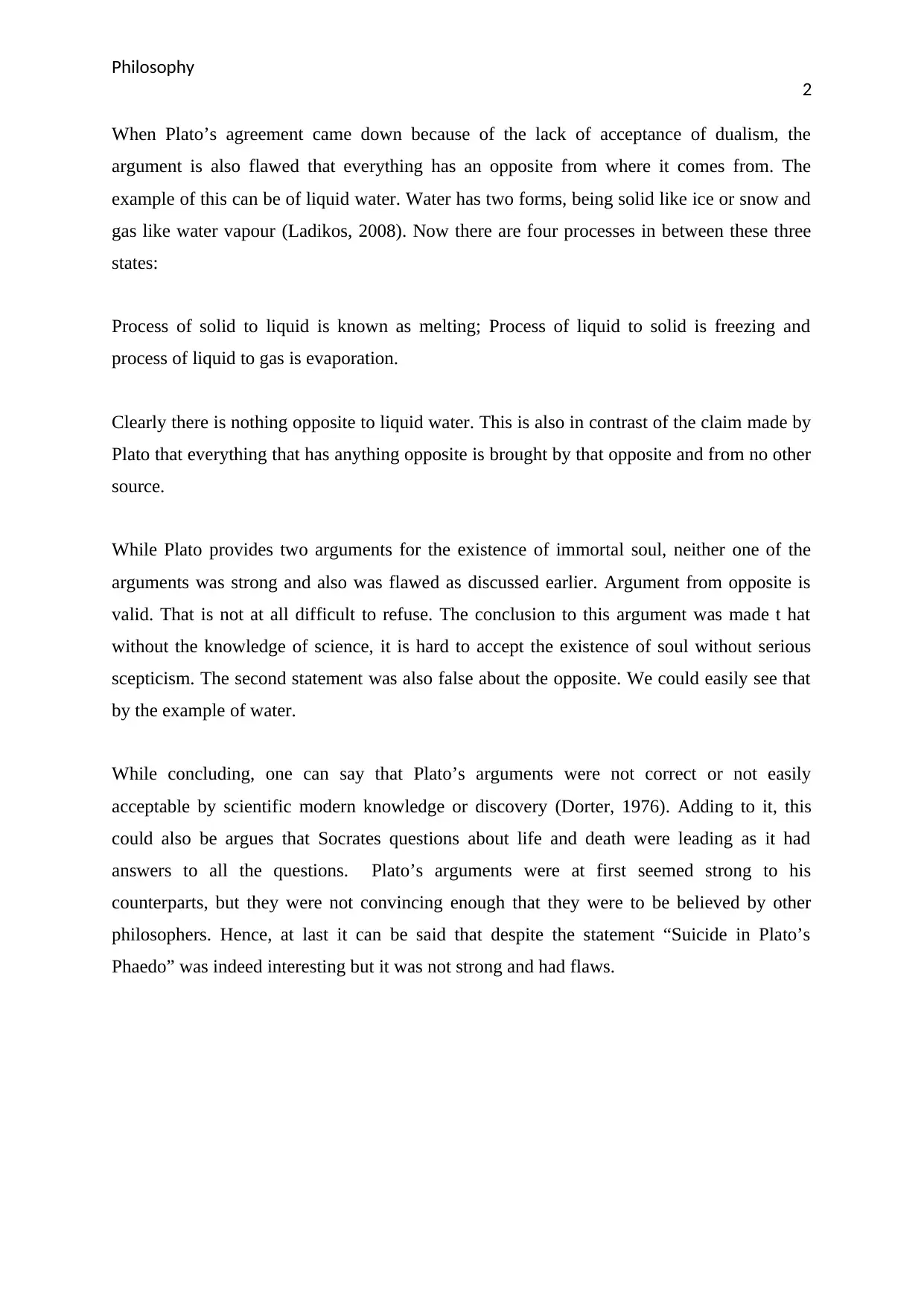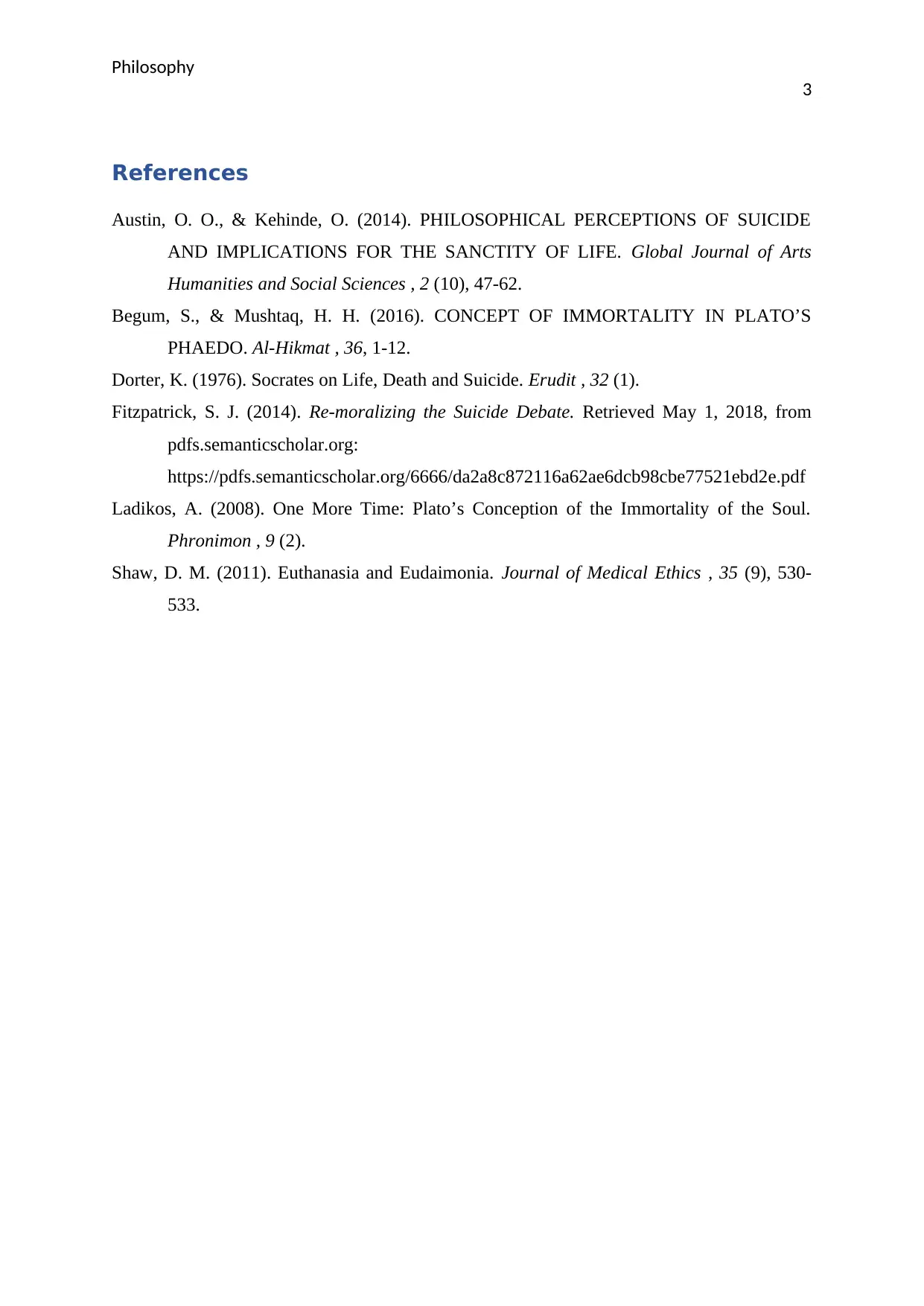A Critical Examination of Suicide in Plato's Phaedo: Philosophy Essay
VerifiedAdded on 2021/05/31
|4
|1034
|111
Essay
AI Summary
This essay delves into Plato's philosophical arguments concerning suicide, primarily drawing from his work, Phaedo. The essay examines Socrates' perspective, emphasizing the belief that suicide is morally wrong due to divine prohibition and the sanctity of life. It explores the concept of the soul's immortality and its separation from the body after death, as conveyed through Plato's dualistic understanding. The essay critiques Plato's arguments, pointing out flaws in his reasoning, particularly the lack of scientific backing for the soul's existence and the weakness of his argument from opposites. It highlights the limitations of Plato's arguments in light of modern scientific knowledge and concludes that, while interesting, Plato's arguments are not easily accepted and are flawed.

Running Head: Philosophy
Philosophy
Suicide in Plato’s Phaedo
Philosophy
Suicide in Plato’s Phaedo
Paraphrase This Document
Need a fresh take? Get an instant paraphrase of this document with our AI Paraphraser

Philosophy
1
Phaedo of Plato makes lots of arguments which are valued and considered. One of those
arguments refers to Socrates opinion of suicide. Socrates and other authors discuss about the
act of killing oneself is right or wrong. Socrates believed that it is wrong to kill oneself as
God does not want this to happen (Fitzpatrick, 2014). He will punish people if they do so.
This life is given by God and people should not take it away. When Socrates and his friends
were thinking about this, they also thought it was a good thing as the soul is then freed from
the body which is a painful thing anyway. Socrates at the same time also said that
philosophers should not at all fear death as they are the people who possess more value on
knowledge as compared to the desires which are associated with the body. According to him,
death was nothing more but the disintegration of the body and soul where soul leaves body
after death. Also that a philosopher should not be sad about this fact too as after death they
detach themselves from the bodily concerns like food, drink, emotions etc.
Then Plato used Socrates for conveying dualistic understanding of the soul and the body.
According to Plato, the soul is separated after death but still lives as a different entity. After
Plato suggested his idea about soul after death, he did not argue whether the soul exists or not
in real. He instead hypnotized the idea about the body dying and the soul lives somewhere
else. There was no backing about such philosophy which he did (Austin & Kehinde, 2014).
The belief of Socrates was more believable than Plato’s as his reason his theory too. He
stated that person who dies still has hope after death. Cebes (Socrates Friend) then stated that
many people will not accept this theory of the existence of soul in someone else after the
death. There was ancient Greek theory which believed that everything thing that exists is and
up of atoms and can easily be dispersed for building other elements (Shaw, 2011). Plato
disallows this statement which can just be speculated instead of focussing on the explanation
as to why he believes soul is immortal and it is a viable theory. Heraclitus claimed that
underlying substances was natural state of universe. Plato used this statement for arguing that
life comes from death for supporting the belief in immortality.
If there is no dualistic theory, then soul and the body will not separate by death as there is no
soul and hence, there will no chance of the soul being immortal. The entire argument comes
down if this is false (Begum & Mushtaq, 2016).
1
Phaedo of Plato makes lots of arguments which are valued and considered. One of those
arguments refers to Socrates opinion of suicide. Socrates and other authors discuss about the
act of killing oneself is right or wrong. Socrates believed that it is wrong to kill oneself as
God does not want this to happen (Fitzpatrick, 2014). He will punish people if they do so.
This life is given by God and people should not take it away. When Socrates and his friends
were thinking about this, they also thought it was a good thing as the soul is then freed from
the body which is a painful thing anyway. Socrates at the same time also said that
philosophers should not at all fear death as they are the people who possess more value on
knowledge as compared to the desires which are associated with the body. According to him,
death was nothing more but the disintegration of the body and soul where soul leaves body
after death. Also that a philosopher should not be sad about this fact too as after death they
detach themselves from the bodily concerns like food, drink, emotions etc.
Then Plato used Socrates for conveying dualistic understanding of the soul and the body.
According to Plato, the soul is separated after death but still lives as a different entity. After
Plato suggested his idea about soul after death, he did not argue whether the soul exists or not
in real. He instead hypnotized the idea about the body dying and the soul lives somewhere
else. There was no backing about such philosophy which he did (Austin & Kehinde, 2014).
The belief of Socrates was more believable than Plato’s as his reason his theory too. He
stated that person who dies still has hope after death. Cebes (Socrates Friend) then stated that
many people will not accept this theory of the existence of soul in someone else after the
death. There was ancient Greek theory which believed that everything thing that exists is and
up of atoms and can easily be dispersed for building other elements (Shaw, 2011). Plato
disallows this statement which can just be speculated instead of focussing on the explanation
as to why he believes soul is immortal and it is a viable theory. Heraclitus claimed that
underlying substances was natural state of universe. Plato used this statement for arguing that
life comes from death for supporting the belief in immortality.
If there is no dualistic theory, then soul and the body will not separate by death as there is no
soul and hence, there will no chance of the soul being immortal. The entire argument comes
down if this is false (Begum & Mushtaq, 2016).

Philosophy
2
When Plato’s agreement came down because of the lack of acceptance of dualism, the
argument is also flawed that everything has an opposite from where it comes from. The
example of this can be of liquid water. Water has two forms, being solid like ice or snow and
gas like water vapour (Ladikos, 2008). Now there are four processes in between these three
states:
Process of solid to liquid is known as melting; Process of liquid to solid is freezing and
process of liquid to gas is evaporation.
Clearly there is nothing opposite to liquid water. This is also in contrast of the claim made by
Plato that everything that has anything opposite is brought by that opposite and from no other
source.
While Plato provides two arguments for the existence of immortal soul, neither one of the
arguments was strong and also was flawed as discussed earlier. Argument from opposite is
valid. That is not at all difficult to refuse. The conclusion to this argument was made t hat
without the knowledge of science, it is hard to accept the existence of soul without serious
scepticism. The second statement was also false about the opposite. We could easily see that
by the example of water.
While concluding, one can say that Plato’s arguments were not correct or not easily
acceptable by scientific modern knowledge or discovery (Dorter, 1976). Adding to it, this
could also be argues that Socrates questions about life and death were leading as it had
answers to all the questions. Plato’s arguments were at first seemed strong to his
counterparts, but they were not convincing enough that they were to be believed by other
philosophers. Hence, at last it can be said that despite the statement “Suicide in Plato’s
Phaedo” was indeed interesting but it was not strong and had flaws.
2
When Plato’s agreement came down because of the lack of acceptance of dualism, the
argument is also flawed that everything has an opposite from where it comes from. The
example of this can be of liquid water. Water has two forms, being solid like ice or snow and
gas like water vapour (Ladikos, 2008). Now there are four processes in between these three
states:
Process of solid to liquid is known as melting; Process of liquid to solid is freezing and
process of liquid to gas is evaporation.
Clearly there is nothing opposite to liquid water. This is also in contrast of the claim made by
Plato that everything that has anything opposite is brought by that opposite and from no other
source.
While Plato provides two arguments for the existence of immortal soul, neither one of the
arguments was strong and also was flawed as discussed earlier. Argument from opposite is
valid. That is not at all difficult to refuse. The conclusion to this argument was made t hat
without the knowledge of science, it is hard to accept the existence of soul without serious
scepticism. The second statement was also false about the opposite. We could easily see that
by the example of water.
While concluding, one can say that Plato’s arguments were not correct or not easily
acceptable by scientific modern knowledge or discovery (Dorter, 1976). Adding to it, this
could also be argues that Socrates questions about life and death were leading as it had
answers to all the questions. Plato’s arguments were at first seemed strong to his
counterparts, but they were not convincing enough that they were to be believed by other
philosophers. Hence, at last it can be said that despite the statement “Suicide in Plato’s
Phaedo” was indeed interesting but it was not strong and had flaws.
⊘ This is a preview!⊘
Do you want full access?
Subscribe today to unlock all pages.

Trusted by 1+ million students worldwide

Philosophy
3
References
Austin, O. O., & Kehinde, O. (2014). PHILOSOPHICAL PERCEPTIONS OF SUICIDE
AND IMPLICATIONS FOR THE SANCTITY OF LIFE. Global Journal of Arts
Humanities and Social Sciences , 2 (10), 47-62.
Begum, S., & Mushtaq, H. H. (2016). CONCEPT OF IMMORTALITY IN PLATO’S
PHAEDO. Al-Hikmat , 36, 1-12.
Dorter, K. (1976). Socrates on Life, Death and Suicide. Erudit , 32 (1).
Fitzpatrick, S. J. (2014). Re-moralizing the Suicide Debate. Retrieved May 1, 2018, from
pdfs.semanticscholar.org:
https://pdfs.semanticscholar.org/6666/da2a8c872116a62ae6dcb98cbe77521ebd2e.pdf
Ladikos, A. (2008). One More Time: Plato’s Conception of the Immortality of the Soul.
Phronimon , 9 (2).
Shaw, D. M. (2011). Euthanasia and Eudaimonia. Journal of Medical Ethics , 35 (9), 530-
533.
3
References
Austin, O. O., & Kehinde, O. (2014). PHILOSOPHICAL PERCEPTIONS OF SUICIDE
AND IMPLICATIONS FOR THE SANCTITY OF LIFE. Global Journal of Arts
Humanities and Social Sciences , 2 (10), 47-62.
Begum, S., & Mushtaq, H. H. (2016). CONCEPT OF IMMORTALITY IN PLATO’S
PHAEDO. Al-Hikmat , 36, 1-12.
Dorter, K. (1976). Socrates on Life, Death and Suicide. Erudit , 32 (1).
Fitzpatrick, S. J. (2014). Re-moralizing the Suicide Debate. Retrieved May 1, 2018, from
pdfs.semanticscholar.org:
https://pdfs.semanticscholar.org/6666/da2a8c872116a62ae6dcb98cbe77521ebd2e.pdf
Ladikos, A. (2008). One More Time: Plato’s Conception of the Immortality of the Soul.
Phronimon , 9 (2).
Shaw, D. M. (2011). Euthanasia and Eudaimonia. Journal of Medical Ethics , 35 (9), 530-
533.
1 out of 4
Related Documents
Your All-in-One AI-Powered Toolkit for Academic Success.
+13062052269
info@desklib.com
Available 24*7 on WhatsApp / Email
![[object Object]](/_next/static/media/star-bottom.7253800d.svg)
Unlock your academic potential
Copyright © 2020–2026 A2Z Services. All Rights Reserved. Developed and managed by ZUCOL.





